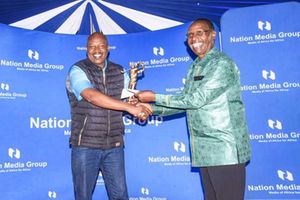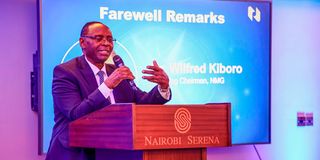
Nation Media Group's outgoing Chairman Dr Wilfred Kiboro speaks during a farewell dinner at Serena Hotel, Nairobi on June 27, 2025.
Supposing a front page headline were to be written about Dr Wilfred Kiboro, the 80-year-old industry captain who retired as Nation Media Group (NMG) Board Chairman on Friday.
What words would feature in that headline?
Well, if you were to ask Fatuma, his wife of 56 years, she would probably suggest the word “perfectionist”.
“He likes to be perfect,” she says. “Wherever he has worked or wherever he has been, he has tried to be on top of everything.”
Mrs Kiboro, who describes her husband as “my best friend”, might also have the word “workaholic” in the headline.
“He puts his work above anything else,” she says.
So, when we sat down for an interview with Dr Kiboro at his Nairobi home, beneath a refreshing shade of clean and calm air, he explained the origins of his workaholic nature.
“There’s no point of working if you don’t give it your all,” said Dr Kiboro, disclosing that being brought up in a family of 11 children taught him to be independent at a young age.
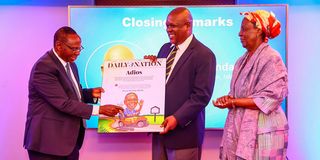
Nation Media Group PLC Board Chairman Mr Joseph Muganda (centre) presents a gift to outgoing chairman Dr Wilfred Kiboro during a farewell dinner at Serena Hotel, Nairobi, on June 26, 2025. Looking on is Mrs Fatuma Kiboro.
“When I was in Class Five, I had to move away from home because there was no intermediate school in my area,” he said. “At the age of 10, I was looking after myself. I had to go and cook for myself, study and everything else. I was away from home with my elder brother.”
The Kiboros have four children, five grandchildren and one great-grandchild. The interesting aspect about them is that Dr Kiboro is a dyed-in-the-wool Catholic while Mrs Kiboro is a Muslim. All their children were raised as Catholics but converted to Islam in adulthood.
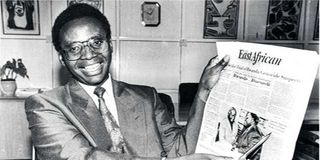
Dr Wilfred Kiboro as the Nation Media Group Managing Director with a copy of The East African newspaper.
“You know, for Christianity and Islam, the only divergent point is the New Testament,” says Dr Kiboro.
When with them at the family dinner table, it is clear they are the best of friends as the banter between them won’t stop.
“My husband was called Kiboro wa Nation,”jokes Mrs Kiboro. “But now he’s not going to be Kiboro wa Fatuma.”
Dr Kiboro opposes.
“No, no, I’m not going to be Kiboro of Fatuma. I’ll be Kiboro of Njeri because Njeri is my mum,’” he jibes back.
Anyway, back to the search for a headline to capture Dr Kiboro’s story. If you were to ask for the input of Mr Francis Okello, who served on the NMG board for two-and-a-half decades, the word “polymath” is likely to crop up.
“Wilfred is an engineer, but an engineer who is comfortable discussing economics, is comfortable discussing law, is comfortable discussing all kinds of disciplines,” says Mr Okello.
He adds that Dr Kiboro’s intelligence across disciplines is immensely beneficial.
“Problems don’t come in silos. They come in a very complex manner. An effective leader is he or she that is able to pull different strands of knowledge and apply them in solving the problems. So, Wilfred is one of the few leaders I know that have the unique ability to apply ‘interdisciplinarity’ and ‘polymathy’ in solving fairly complex problems, because, I think, of his experience and exposure,” says Mr Okello.
Responding to the compliment of his polymathy, Dr Kiboro recalled that he used to be good in all subjects when he was a student, especially when he was at Mang’u High School.
“If you get credits in all the subjects, it means that you are sort of an all-rounder. But my bias was more towards the sciences: doing double maths, physics, chemistry, and stuff like that. And that’s how I ended up in engineering,” he said.
Civil engineer
To keep his mind sharp, he noted, he reads a minimum of two books a week.
Dr Kiboro trained as a civil engineer. His interest in the field was piqued by a man he met at the United Kenya Club when he had gone to listen to Tom Mboya. Later, he got sponsorship from the East African Railways and Harbours to pursue an engineering degree at the University of Nairobi.
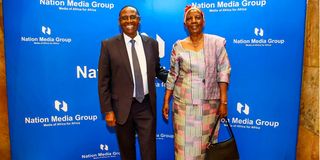
Nation Media Group's outgoing chairman Dr Wilfred Kiboro and his wife Ms Fatuma Kiboro during the NMG board farewell dinner at Serena Hotel, Nairobi, on June 26, 2025.
After graduation, he worked in engineering for two decades before his path led to business leadership.
“Before I came to the media in 1993, I built a whole career before. I had been in the oil industry for close to 20 years, and after leaving the railways [as an engineer], I worked for multinational oil companies. I worked for Shell, I worked for Exxon, and I had a stint in Europe and the Far East. So, I had a whole career in the oil industry.”
He joined Nation Media Group after being headhunted. He was initially reluctant, given that he was green on matters media, but the recruiters won him over. He stayed as CEO for a decade. Over that period, he engineered a number of transformations that included expanding to neighbouring countries and adding radio and TV functions to the stable.
In 2009 he became the NMG board chairman.
Given his achievements as chairman, former board member Wangethi Mwangi would suggest the phrase “strength of character” in crafting a headline about Dr Kiboro.
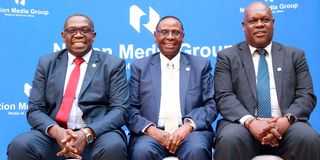
From left: Nation Media Group's Managing Director and CEO, Mr Geoffrey Odundo, NMG Board Chairman, Mr Joseph Muganda and outgoing Board Chairman, Dr Wilfred Kiboro, during the presentation of the 2024 Annual Report and Financial Statements at Serena Hotel in Nairobi on June 27, 2025.
“[He has] strength of character and determination to ensure that editorial independence was not compromised at any one time [when] pressure came not just from the political class and the commercial class,” said Mr Wangethi, who is so far the longest-serving NMG Editorial Director.
Dr Kiboro says he had to be decisive.
“That’s what you are paid to do if you are chairman,” he joked. “If you are chairman, you are supposed to make decisions.”
He went on: “It is better to make a wrong decision than no decision at all. Sometimes you make bad decisions. I have made many in my life. But if you really want to move forward, you need to make a decision. You find that a lot of organisations have a good strategy, good plans and everything, but they never get executed. Why? Because people find it difficult to make decisions at the right time, in a timely manner.”
He terms it “a good experience” when his decisions are proven wrong.
“However, hanging around without any opinion, I don’t think that is the way for anybody to go,” he said.
One person who would testify to Dr Kiboro’s decision-making is Mr Sekou Owino, the NMG Head of Legal.
“[His] consistent trait is clarity of thought,” he said. “Whenever something occurred where we needed the chairman’s input, you were always grounded in terms of clarity of how you will be told what to do, or the guidance you would get.”
Protecting forests
Even the inanimate would want to suggest the shaping of that headline on Dr Kiboro. Notably, the Aberdare Forest and the Karura Forest might want the headline to include the word “defender”. This is because he used his power and influence to fight for the forests in various ways.
In the case of Aberdare, he was part of an influential group that raised funds to fence it and prevent encroachment.
Through the initiative, the group raised funds to build a 400-kilometre electric fence.
“The government did not help us at all. To build that took almost 10 years-plus. I was on the board of the Rhino Ark and we mobilised a lot of people,” he said.
The project almost cost him his life. In April 2004, he was in a helicopter that crashed in the Aberdare forest. All aboard escaped unscathed. They had gone to inspect the progress of the fence when the unexpected happened.
“Before we knew it we were [on the ground], upside down. I was up there because I was in the pilot seat. The pilot was down below me and I was buckled up. If I removed the buckle, then I would fall onto him. Luckily, it didn’t catch fire,” he says.
Upon being rescued, he called his wife to tell her that he was fine. And then he made the interesting decision to board another helicopter back to the city.
“It was one of the most difficult decisions to make because you have survived one helicopter crash and you go and board another helicopter within a matter of minutes,” said Dr Kiboro.
Some opted to go by road.
“You don’t die before your time comes,” he said, looking back at the tragedy. “I think, in truth, we should have died. How many people survive an air crash?”
“I think God knew that we were there for a good cause; it wasn’t our time to die. But, of course, you know that you didn’t survive because of anything that you did; it’s just by God’s mercy. So, if God wishes you to die, you die any time,” he added.
In the case of Karura Forest, Dr Kiboro was involved in the fight to save it that also included celebrated environmentalist Wangari Maathai.
“We fought [President Daniel arap] Moi’s allocating land in Karura Forest, and we started its reforestation,” he says. “And now Karura Forest is sort of saved up to now. Except I don’t know who is trying to encroach on it.”
Why this passion for nature? We asked him. One of the reasons was an experience he had in China when he was the chairman of Standard Chartered Bank Kenya.
“The hotel I was staying at was on the 93rd floor, a big hotel, a five-star hotel. But from my window down, I couldn’t see downstairs because of the smog and everything else. It was long before Covid but everybody was wearing masks because of the pollution,” he says.
Another inanimate thing that may want to have a say in crafting a headline for Dr Kiboro’s story is the Uhuru Gardens. They may suggest a word like “optimist”.
This is because on that historic night in December 1963 when the Union Jack was lowered and the Kenyan flag hoisted, he was there.
“I had just left high school. So, I knew exactly what was happening,” he said. “At midnight when the flag was raised, I was right there. I can tell you, it was euphoric.”
Were you to approach NMG’s CEO Geoffrey Odundo to suggest a headline for Dr Kiboro’s story, he will most likely throw the word “integrity” into the mix.
“I feel very privileged to have learnt a lot from him in just two months, key among them being the value of integrity, the value of resilience, the ability to look through situations optimistically, and I think that’s what a media house needs, given the challenges we face on a day-to-day basis,” says Mr Odundo.
NMG’s Editor-in-Chief, Joe Ageyo, would likely recommend the word “defender” too.
“He was a fierce defender of the space for journalists to do their work, he championed the public interest, he championed the independence of media, but he also championed such tenets as accuracy to make sure that our journalism was unimpeachable,” says Mr Ageyo.
In his retirement, Dr Kiboro has a lot lined up. He says that in the past 24 months, he has been “gradually distancing” himself from his engagements, which also included being the Family Bank board chairman and the chancellor of Riara University.
“I think that has been very well-choreographed. You know, pole pole,” he said.
Above all, he considers heading NMG the most demanding job.
“I’ve been chair of many big organisations. But in terms of the demand for time, I think the Nation Media Group is the one which has taken a lot of my time because it’s a 24/7 job. When things go haywire, it is not just the CEO but the entire board and especially the chairman that gets roped in,” said Dr Kiboro.
“But of course, at 80, I think one has to accept that you need to slow down in some of these things… my journey with the Nation Media Group has been very, very fulfilling.”
He is grateful for the confidence that the NMG founder, His Late Highness the Aga Khan IV, had in him.
Busy in retirement
In retirement, his wife wants them to travel the world and visit relatives they have not seen in a while — and Dr Kiboro concurs.
“I am not short of things to do. I have a lot of things to do, I think sometimes people say that if you want something done, get somebody who is busy to do it, because I am involved in a lot of stuff,” he said.
His engagements include family businesses (that include a floriculture venture and real estate investments), church, and family.
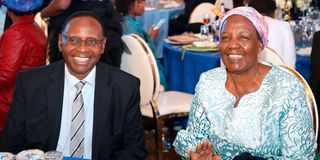
Dr Wilfred Kiboro (left) with his wife Fatuma Kiboro at a past event.
“Our family is big, big, big. When we have annual gatherings, we do it on Zoom because it’s not possible to have everybody around,” said Dr Kiboro.
The first place he is likely to visit with his wife is Australia.
“I hope I’ll have an opportunity to play golf in some of the Australian golf courses and so on and just relax. After that, we will go to Canada and spend a bit of time with some of our relatives there. We also plan to go to maybe Atlanta and spend time with some of our relatives there. We have some relatives in South Africa as well. There is also a very good golf course in Pretoria,” said Dr Kiboro, whose love for golf is well-documented.
Mrs Kiboro adds: “We’ll travel and see all those relatives we brought up and are now in the diaspora.”
“[He is] a very kind person. He has helped a lot of people. Up to now, we support a lot of people,” she says.
In his 32 years of leadership at NMG, he had to face presidents to explain coverage of stories, plead for television and radio frequencies, and beg to have stations switched back on air.
“Where you have a very vibrant media, it will perhaps always rub the powers-that-be the wrong way, because people, human beings, do not like being held accountable,” he reasoned.
Through all that, he managed to grow a media giant.
“I’ve stayed in the Nation for these 32 years because I think there was a cause for me to be there,” he said.
He added that what kept him going is “seeing that there is a role you can play in actually making a difference to the political and economic evolution to make Kenya a better place, East Africa a better place, Africa a more integrated continent”.
“It has been a journey of major transformation. When I joined the group in 1993, it was just two papers: Taifa Leo and Nation. But I’m happy to say that the group grew to be what it is today: a proper multimedia enterprise, spanning the whole East African Community and becoming by far the most successful and most influential media house in East and Central Africa.”
“One of the most exciting periods was when we were allowed to go into broadcasting,” he recalled.
But still, not all words to describe him can fit in the headline. “Humble”, “fair”, “sust-ainability-minded”, “inspirational” and “flexible” are among those we picked from people who have worked closely with him over the years.
“Chairman has a passion and love for the brand. And that’s why he has served this brand for the last 32 years,” said Ms Jane Muiruri, the NMG head of human resources. “That’s what I have observed over the years: Passion from his heart about the brand.”
Dr Kiboro, while summing it all up, said: “It has been a good time for me, but I think it is very important for institutions, for people, to understand that a time comes when you have to make that transition.”
And he was confident that NMG is “in very competent” hands.



